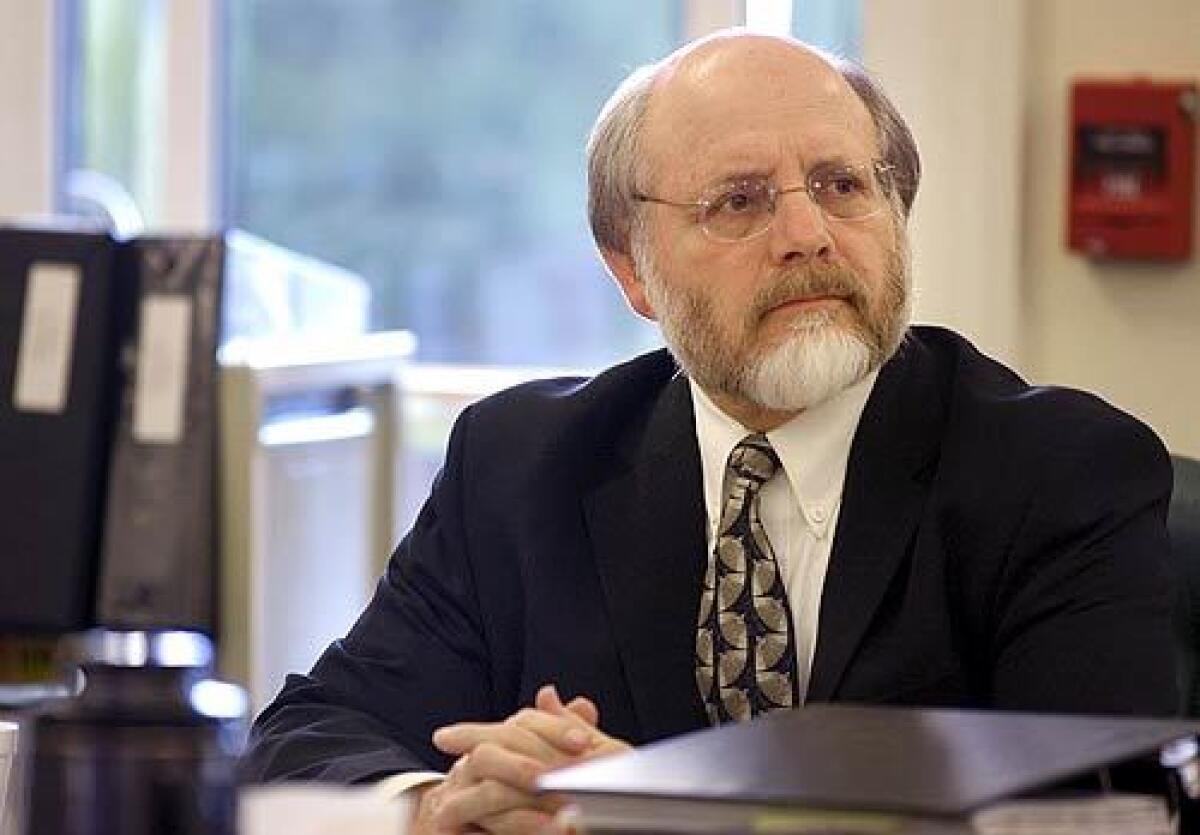Riverside judge removed from the bench

- Share via
Judge Robert Spitzer, whose courtroom quirks and messy ways were well known in Riverside County’s legal community, was removed from the bench Tuesday by the state judicial oversight panel for serious misconduct and “gross neglect” of his duties.
The state Commission on Judicial Performance had been investigating the Riverside County Superior Court judge since 2003 when his supervisor reported that he was falling months behind on issuing court orders.
The disorganization of Spitzer’s courtroom, where files were stacked on windowsills and even in his private bathroom, was so severe that even his clerk refused to hunt for missing orders, according to testimony from his presiding judge and court personnel.
Those initial complaints triggered a broad review of Spitzer’s conduct, from his controversial comments on the bench to complaints that he had contacted potential witnesses in cases before him without knowledge of the trial attorneys.
The commission said Spitzer’s “inexcusable delays, failure to act and gross neglect of court orders demonstrates an unwillingness or inability to perform judicial functions.”
The commission’s members highlighted one “egregious” incident in which Spitzer initiated a private conversation with the mother of a 13-year-old boy who had been killed by a drunk driver.
The mother alleged that Spitzer pressured her to ask the prosecutor to pursue charges less serious than murder after an initial mistrial in the case.
“Attempting to convince a mother whose child was killed by a drunk driver that her child’s death was unintentional . . . reflects an alarming lack of sensitivity in addition to being extraordinarily inappropriate and unjudicial,” the report said.
The commission said in Tuesday’s report that the conversation, and contact with witnesses in two other criminal cases, was “fundamentally at odds with the integrity and restraint expected of the judiciary.”
The commission’s members also said Spitzer was deceptive during commission proceedings and “the lack of candor and accountability . . . raises substantial concerns regarding his suitability to remain on the bench.”
“This pattern of repeated wrongdoing leaves us with no doubt that Judge Spitzer lacks the temperament and ability to perform judicial functions,” the commission said in the report.
Spitzer could not be reached for comment Monday. One of his attorneys, Reginald Vitek of San Diego, said he and his client would meet today to discuss whether they would petition the California Supreme Court for a review of the decision.
Some of Spitzer’s colleagues said they were saddened by the removal, but not surprised after the contentious tone of Spitzer’s final hearing before the panel in San Francisco last month.
“Everything Robert did was well-intentioned,” said Riverside County Superior Court Judge Paul Zellerbach, a longtime friend.
“For the past couple of years, he’s tried more cases than any other judges in Riverside County. . . . It doesn’t seem the commission took into account all of the good things that he’s contributed to Riverside County,” he said.
Richard Fields, the presiding judge for Riverside County Superior Court, said he went to Spitzer’s courtroom Tuesday morning and asked him to leave the bench immediately, although Spitzer was in the midst of jury selection.
Fields described Spitzer as “an extraordinarily hard worker” and recalled many late evenings where he would stop by Spitzer’s office and find him puzzling through cases in his methodical, academic manner.
“He really contemplated his cases and tried to give them the best he had,” Fields said. “I think the loss of such an experienced judge at this critical time in the court’s history will be felt by the court for a long time.”
Cyrus Godfrey, a Beverly Hills Los Angles-based attorney who has known Spitzer since they were classmates in high school, said he was stunned by Spitzer’s removal.
In high school, Spitzer was “honestly one of the most amazing people we had ever seen,” Godfrey said. “He was No. 1 in his class, while being class president and editor of the yearbook. . . . He accomplished just an incredible amount.”
After graduating summa cum laude from UCLA with a degree in political science in 1971, Spitzer spent more than a decade handling serious felony prosecutions in the Riverside County district attorney’s office.
Though he was an avowed opponent of the death penalty when he was hired, he vigorously pursued a death penalty conviction for the man who strangled 15-year-old Susan Jordan as she walked to Arlington High School in Riverside in 1980. The jury convicted Albert Greenwood Brown of the murder, but the conviction and death sentence are still being reviewed in federal court.
Riverside County Dist. Atty. Rod Pacheco said Spitzer was well-liked and respected as a supervisor in the D.A.’s office.
“He was easy to work with and very bright,” Pacheco said in a recent interview. Though Spitzer’s organization problems were well known, Pacheco said, “we found it endearing. . . . It didn’t have consequences back then.”
Spitzer became a Superior Court judge in 1998 after eight years on the municipal bench.
He was transferred from the criminal division to civil in 2001 because the Riverside County district attorney’s office had begun routinely disqualifying him from hearing criminal cases, according to testimony the commission from then-Presiding Judge Douglas P. Miller.
The problems mounted in the civil division when Miller and court clerks began getting angry calls from litigants about delays.
Spitzer testified during proceedings that the delays were due to his “obsessive-compulsive” nature and a desire to ensure that each matter he handled was done perfectly.
But the delays, which in one case stretched for six years, showed “a complete indifference to the rights of litigants and his judicial responsibilities,” the commission stated.
More to Read
Sign up for Essential California
The most important California stories and recommendations in your inbox every morning.
You may occasionally receive promotional content from the Los Angeles Times.










